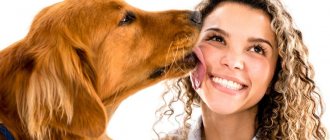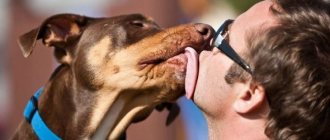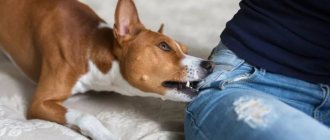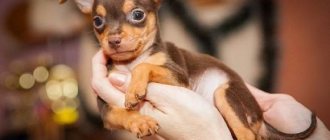While observing my dog, I noticed that one of the many things he does every day with great fervor is lick his feet. Is this a cause for concern?
Ah, our four-legged friends. They often do things that irritate us many times. This could be licking the floor, eating scraps of food, or simply licking our feet or hands. However, we forget that dogs try to communicate with us through actions.
Understanding why your dog does what he does is critical to keeping your dog connected, healthy, and well-being. That's what a friend is for! To help.
I have come across people who complain about their dogs licking the feet of their owners or strangers. A person might be ticklish, okay, that might be an understandable reason why we don't like it. The dog is definitely not doing this to tickle us.
© shutterstock
Remember, you should never yell or hit an animal to stop an activity that the four-legged animal is performing. If your dog has a habit of licking his feet, it is worth looking into the problem and approaching it with patience and kindness. There can be many reasons for this behavior, and therefore we cannot ask the dog “what are you doing?” we can only guess. Each dog may approach foot licking differently.
Dog shows submission
Sometimes when a dog licks your feet, it's submissive behavior. In wild dogs, subordinate members of the pack always licked the more dominant members. This behavior helps wild dogs maintain pack harmony. Although we now know that dogs do not perceive us as their pack leaders, sometimes by licking your feet a dog remembers natural instincts. Plus, if you praise him or otherwise respond positively when he licks your feet, he will continue to do it because he likes the reaction it gets.
Health problems and licking of front or back paws
The first step is to determine if there are any paw health problems. Dogs may lick their front or back paws excessively if they are itchy, irritated, or painful.
Damage to the paw or the presence of a stuck foreign object can explain the sudden manifestation of changes in behavior, expressed in paw licking. The dog may have stepped on something causing discomfort. For example, a sharp object or hot pavement. The animal may have been bitten by an insect or other animal. Or is it simply an object or substance stuck or stuck to the paws that requires human help to remove it. Foreign objects such as splinters and pieces of plants can get stuck in the paws and cause irritation.
Another possibility is that the dog has a mass on one of its paws, like a cyst or tumor. Or the dog has arthritis, injury to the soft tissue or bones of the paw. The latter cannot be seen with the naked eye.
A paw injury, foreign object, or swelling is most likely if a dog focuses on one paw more than the others. However, these problems can affect more than one limb at a time.
Allergies often cause the paw pads to become itchy or irritated, causing the dog to lick them excessively. Many dogs have food and/or environmental allergies that cause discomfort in their limbs. Food allergies most often cause itchy paws.
Infections also cause dogs to lick their paws. Many individuals develop bacterial or fungal infections of their paws. These infections can occur for a variety of reasons. However, sometimes they are secondary to allergies. When a dog licks his paws excessively, they remain wet and are more susceptible to bacteria and fungal spores. External parasitic infections, such as fleas or mange, can also cause itchy paws, leading to excessive licking.
If there is no physical reason for your dog to lick his paws excessively, it is acceptable that your dog has behavioral problems.
Your dog is collecting information
Dogs gather information by licking their feet (and other things too). Your dog uses millions of scent receptors located in his mouth and nose to collect and process information. Yes, your sweaty feet, which contain sweat glands made of salt, waste and water, provide your dog with information about you.
When he licks his feet, your dog is using his Jacobson's organ, an olfactory receptor that allows him to detect certainly subtle odors, like those in your sweat. She may also use this organ at the dog park when sniffing other puppies, or when sniffing the ground to figure out where to pee.
Dating method
Probably all pet owners have noticed that when meeting a new person, the dog always sniffs and sometimes even licks the people who came to visit you. Thus, the receptors located in the animal’s nose and tongue accumulate and store unique information about the stranger and help to immediately recognize him the next time he meets.
There is also an assumption that animals like the taste and smell of the human (especially a little sweaty) body, and the texture of the skin. Many are sure that four-legged animals lack some trace elements or salt, which are released through sweat. This has not been scientifically proven, but it may well be one of the reasons why a dog licks its owner.
This is what he learned as a puppy
Mother dogs lick their puppies to groom them, remove the placenta, and encourage them to breathe, move, and go to the bathroom. She also licks them to show them love and affection. As puppies grow up, they take the behaviors they learned from their mothers and apply them to their owners. When your dog licks your feet, he is using his instincts and showing the same affection.
© shutterstock
Briefly about the main thing
- Dogs lick people as a sign of deep respect and admiration.
- The licking instinct is passed on to puppies from their mother and helps identify pack members.
- If a dog licks you lightly when meeting you, this is a sign that it wants to remember you better.
- Dog saliva contains lysozyme, a substance that kills bacteria. Licked wounds in dogs heal much faster.
- If your dog is licking you, the floor, or toys uncontrollably, consult a professional. In the absence of pathologies, spend more time walking and playing with your pet.
Have you noticed such habits in your pets? Were you able to read them correctly? We invite our dear readers to share their life experiences.
Did you like the article? Share it with your friends on social media. networks. This will help them get useful information and support our project.
Is it bad for a dog to lick its feet?
In most cases there is no problem with this. However, if she does this constantly, she may be worried about something. She may be worried and need your help. If you just moved into a new home or brought home another pet or someone new, your dog may start to feel stressed and lick their feet more often. Over time, she should adjust to the new shift, but you can always give her her favorite toys, cuddle her as much as possible, and leave her a comfortable bed to sleep in when you're not home to help her feel better.
It is not healthy for your dog to lick your feet if you have any chemicals on your feet , such as from lotion or medications. Let's say you have a mosquito bite on your legs and you apply anti-itch cream to it. The ingredients in it may be harmful to dogs. If your dog licks your feet and then starts vomiting or vomiting, or has diarrhea, then you should take him to the vet immediately.
Additionally, you may simply not like it when your dog licks your feet. If this is the case, ignore your dog (or even walk away) when he licks your feet, and reward him with treats and praise when he is at your feet but not licking them. You can also redirect him by giving him something that is appropriate to lick, such as a Kong full of treats or peanut butter. (Just make sure the peanut butter doesn't contain xylitol, which is toxic to dogs.)
What do licks mean?
Understanding what certain licks mean will allow you to respond correctly to your dog. For example, if she wags her tail, jumps up, tries to put her paws on her chest, and quietly squeals, then this is definitely a manifestation of love.
Other signs:
- constantly licks a specific place on a person’s body - smells a smell that bothers her, for example, an abscess or wound;
- creeps up at a crawl, touches the legs with the tongue - humility, devotion, respect;
- licks his hands and goes to the bowl - a clear sign of hunger;
- licks the owner's hands and stands nearby, does not jump on the chest - asks to play with her, seeks protection, wants to show something;
- licks the owner before going to bed - this gives her a feeling of peace and tranquility;
- in the morning - rejoices at the new day, asks for food or wants to go to the toilet, waits for an active awakening, jogging;
- licks the owner’s ears from the inside - tries to get wax secretions, which have antimicrobial properties and are a natural antibiotic, so he licks the ear;
- licks its owner's nose - an instinct to check the owner's well-being (wet nose/dry nose) or greets after a long separation.
Why does a dog lick its owner's feet?
The owner's lower limbs are the most accessible part of the body for the pet. Therefore, if the dog cannot reach its face, it begins to lick its feet. Thus, it manifests several factors at once:
- expresses love, affection, joy from communication. At the same time, the pet wags its tail, jumps joyfully, squeals or runs around its legs;
- licks the smell of sweat from her feet, which can irritate her or, on the contrary, attract her, especially if it is pronounced;
- tries to heal microcracks on the owner’s feet, heels, and toes.
Is it okay to let your dog lick you?
Bad breath from your pet is not a problem. The problem is that dog saliva contains bacteria that can cause oral diseases in humans.
Don't let your pet lick your face; saliva contains a lot of bacteria.
This applies to all four-legged friends, both large ones like Alabai, Husky or German Shepherd, and representatives of small breeds - pug, chihuahua, Yorkie.
Cattails, just like people, have caries or inflammation.
They occur if the pet accidentally injures the gum with a bone or dry food.
Most often, a person does not even suspect that his pet suffers from an oral disease, since it occurs without obvious symptoms. Studies have shown that 70% of pet watchdogs suffer from periodontitis or periodontal disease.
A person can also “reward” a dog with pathogenic bacteria.
Experts say that people who prohibit excessive tenderness from their tails have much less harmful bacteria in their mouths.
Identification
This point applies more to puppies. By licking the owner, the dog remembers the smell and, oddly enough, the taste of the owner. This is an absolutely normal, even positive phenomenon. It is absolutely forbidden to limit a puppy’s expression of feelings. Most owners note that the more freedom in feelings a dog received in childhood, the more balanced its temperament in adulthood. Moreover, there are breeds whose puppies are especially prone to licking, for example, Cane Corso. A noble dog with a gladiator appearance urgently needs close physical contact with the owner until the age of one year.
If your dog constantly licks you
First of all, we must not forget that this habit is inherent in dogs at the genetic level. Many owners deliberately reinforce this behavior of their pet from childhood, because it is difficult not to be touched when the puppy responds with mutual feelings and delight. After which an adult dog cannot resist licking someone on the cheek or lips once again. Often owners turn a blind eye to this, but this is absolutely forbidden. Dogs' mouths can contain many pathogenic microorganisms that are dangerous to humans.
Instead of weaning an adult dog from the habit of licking you, teach the rules of behavior from childhood. Experts advise reporting unwanted behavior in a firm, calm tone. One solution would be to redirect the dog's attention to the toy and provide regular physical activity. Physical exercise and impressions from walks will help your pet realize its needs, and, in addition, the pet will not need to additionally attract attention to its person. The dog is guaranteed to be happy, and your soul is calm.
Another reason why a dog cannot stop licking someone or something (the floor, toys, furniture) is the onset of the disease. At best, such features indicate behavioral problems that can be addressed by an animal behaviorist. At worst, it is a pathology that requires treatment by a veterinarian. Therefore, be attentive to your pet and try to solve problems at the stage of their early appearance.
Why is my dog licking my hands?
Most dogs like the taste of salt. Well, there is always a small amount of sweat on human hands, which the pet wants to properly taste. In addition, dogs are able to interpret the aromatic molecules contained in human secretions, thereby determining what mood you are in. In other words, by the taste of sweat, the animal is able to understand whether you are happy, worried about something, or just tired. But if you wash your hands properly with aromatic soap, the dog is unlikely to approach them at all, since it is not interested in such a smell.
Lack of attention
On a dark night, an unsuspecting owner is awakened by the licking of an agitated pet - this is a clear sign of lack of attention. A pet will not wake up a person just like that; most likely, the animal is stressed and resorts to licking as a last resort to attract attention - “Even if I am scolded, they will pay attention to me.” So, if attacks of tenderness occur at the most inopportune moment, think about it: perhaps the dog is suffering from loneliness.
The dog senses your mood
For centuries they have been accompanying humans everywhere, dogs have learned to sense a person’s mood and his attitude towards them. They are very loyal to some, most patiently tolerate children's pranks, but there are people who cause pathological aggression in dogs.
Fear has a special smell, this has already been proven. If a person is afraid or hostile, the dog detects this instantly. And he won’t be slow to respond.
Defenselessness and friendliness make these animals want to patronize, protect and protect. By covering his face with his hands and pretending to be crying, a person can easily force his pet to show remarkable care: he will make every effort to spread his fingers with his tongue and get to the eyes and cheeks, worrying, whining, trying to call other family members for help. Only a cheerful laugh or affection from the owner can calm him down.
Ownership issue
There is a version that a dog, by licking the back of a person’s palms in the presence of other people, wants to demonstrate its connection with this person. Or it seems to be laying claim to it. As if it shows “this person is mine, he is busy.” When other people are around the owner, the dog may begin to express its feelings even more actively. She shows that she has weight in this house and for this person.
With these actions, the animal tries to show everyone that it is allowed to invade where others are not allowed - into personal space. Like, “look, I can lick him, and he doesn’t chase me away.”
Palm licking
Solution
If the animal’s strange behavior begins to bother you or you don’t like it at all, you need to try to distract it with something so that it forgets about its owner’s legs. This can be done in the following ways:
- Put socks on your feet.
- Then they play with the four-legged friend or pick him up and talk.
- You need to give him a toy to distract him.
- Walking outside should be active with fairly strong physical activity. Having received many new impressions, he will not bother his owner at home.
- You can try adding salt to your food or pouring salt into a small bowl that is placed next to the water. If the dog starts approaching the salt and licking it, it means that the mineral balance in his body is disturbed. The dog will stop licking its owner's feet once balance is restored.
- If the reason is hidden in loneliness, you need to communicate more often with your four-legged friend. If you don’t have enough time, you can buy a cat, hamster or other pet so that the dog doesn’t feel so lonely.
- Animals cannot tolerate strong odors, especially citrus fruits. It will be unpleasant for them to lick their owner if their face and hands are smeared with these odors.
Dog handlers believe that a dog must be trained from childhood, then unwanted behavior can be avoided. Through training, the pet is prohibited from licking the legs and arms of a person. The final result depends on how much the dog remembers the commands and follows them clearly. For example, you can scare away a pet who is about to show his affection with a loud and sharp sound, clapping your hands. This is done until he understands that he cannot lick the owner.
The basic instincts of animals did not disappear after they began to live next to humans . They mistake a person for a member of their pack. In this regard, owners must carefully examine each dog's affection and find out about the reasons for its manifestation. This will help correct behavior problems in a timely manner.
In someone else's skin
To be able to recognize the essential elements of an animal's umwelt is, in essence, to become an expert on ticks, dogs, people, and so on. This is how we can close the gap between what we think we know about dogs and what they really are.
We can try to assimilate the umwelt of another animal, to incarnate into the animal (bearing in mind the limitations imposed by our sensory system). It's an amazing thing to spend a day being as tall as a dog. Sniffing (even with our less-than-perfect noses) the objects we encounter throughout the day fundamentally changes the way we think about familiar things.
Now pay attention to the sounds in the room where you are - sounds that you are used to and that you do not usually listen to. So, with some effort, I hear the noise of a fan in the corner, the hum of a truck in the distance, the inaudible voices of people climbing the stairs; a wooden chair creaks under someone; my heart is beating; I swallow; The page rustles as it turns. If my hearing had been sharper, I might have heard the scratching of a pen on paper at the opposite end of the room, the sound of a flower growing and the insects talking under my feet. Perhaps other animals hear these sounds clearly.
Expression of love and devotion
Some believe that a dog licks its owner, thus expressing its emotional state, love and devotion. After all, just like us, animals experience different emotions.
And if in an aggressive state a dog can growl and even bite, then in a state of good mood, by licking you, your pet shows how happy and devoted he is to you. By the way, you might be interested in reading about how to stop a dog from biting.
Showing love in dogs
The mother constantly licks the puppies before and after feeding - this is both a necessary hygiene measure, a massage to improve digestion, and a way to calm the little blind creature and let him know that he is not alone. Having matured, the puppy begins to lick its mother in response, demanding affection or showing that it is hungry. And when a person replaces the mother, he automatically begins to show his needs to him in this way. An adult dog, expressing devotion and joy, can run its tongue over the face and hands of the owner, unable to otherwise show feelings.
The dog constantly licks the puppies - this is both a necessary hygiene measure and a massage to improve digestion
Is it worth doing something about this?
Why does a cat lick a person: the main reasons and what it means
If the dog's behavior does not suit the owner, he can try to distract it from his legs. It is better to play with the animal and spend time with it after putting on socks. You should try to switch the dog's attention to another object or toy. During a walk, it is necessary to increase the dog’s physical activity. After such a walk, the animal will receive maximum attention from the owner and will not disturb him. If the owner responds to the dog's behavior with a smile, strokes and words of approval, then the dog will think that it is being rewarded for licking.











